An Evaluation of ABC Bank During the COVID-19 Pandemic
VerifiedAdded on 2023/04/24
|13
|3593
|391
Report
AI Summary
This report, a research project for Project Management 1001021, examines the financial performance of ABC Bank during the COVID-19 pandemic. It investigates the impact of the pandemic on the bank's financial stability, including the effects of lockdowns, economic downturns, and customer loan repayment issues. The research explores the bank's strategies for business recovery, technological advancements, and risk management. The report includes background information on the pandemic's global impact, research objectives, and limitations, such as sample size constraints. It also assesses the bank's performance compared to other global banks, focusing on how capital ratios, non-performing loan ratios, and efficiency ratios affected profitability. The study utilizes secondary data and aims to answer critical questions about ABC Bank's financial health and strategic responses during the crisis, providing insights for banking institutions and regulators. The report also discusses the measures taken by ABC Sri Lanka to ensure financial stability, including the introduction of EKYC, and their success relative to other international banks. The analysis provides a framework for understanding the banking sector's financial performance during the pandemic.
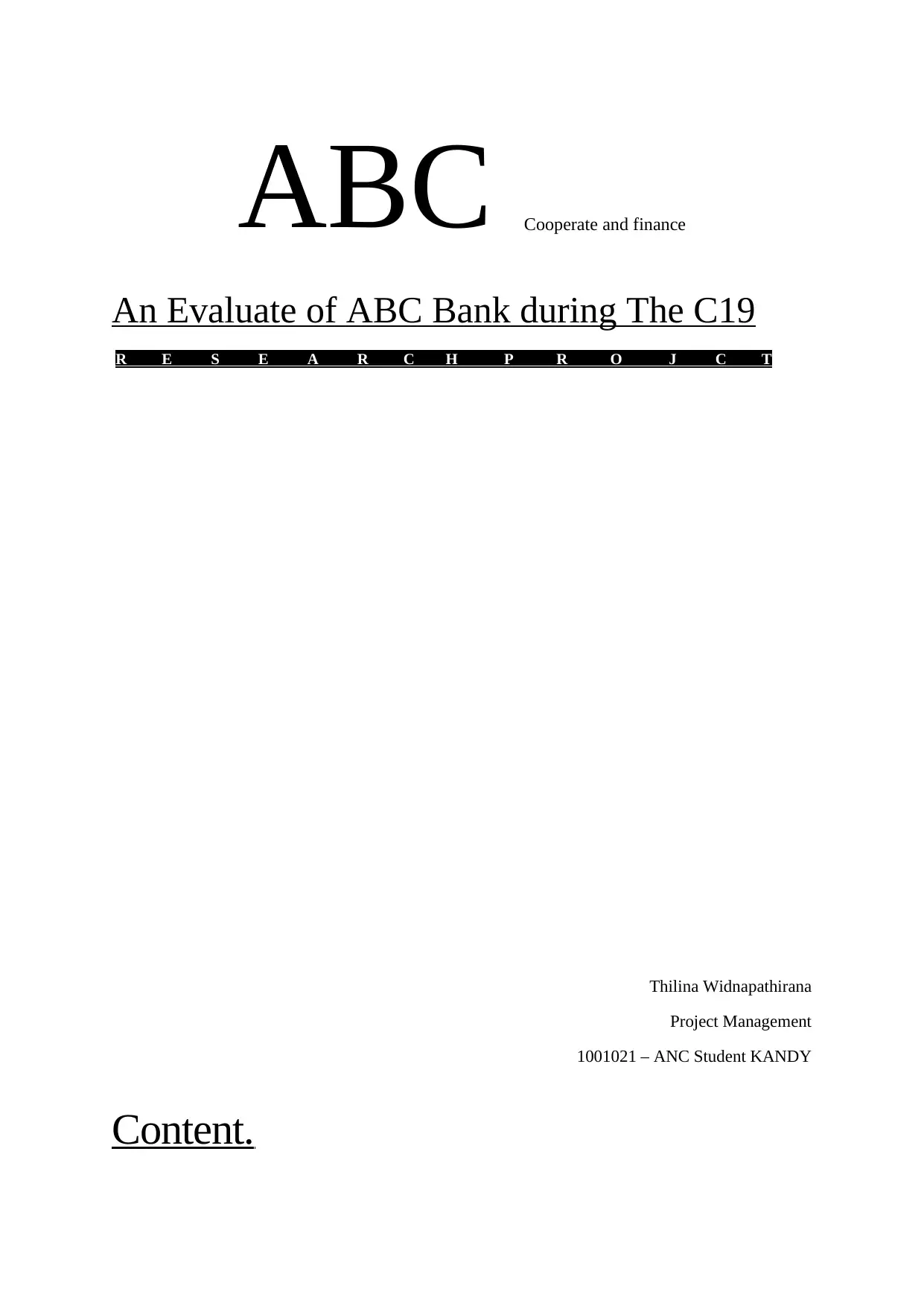
ABC Cooperate and finance
An Evaluate of ABC Bank during The C19
R E S E A R C H P R O J C T
Thilina Widnapathirana
Project Management
1001021 – ANC Student KANDY
Content.
An Evaluate of ABC Bank during The C19
R E S E A R C H P R O J C T
Thilina Widnapathirana
Project Management
1001021 – ANC Student KANDY
Content.
Paraphrase This Document
Need a fresh take? Get an instant paraphrase of this document with our AI Paraphraser
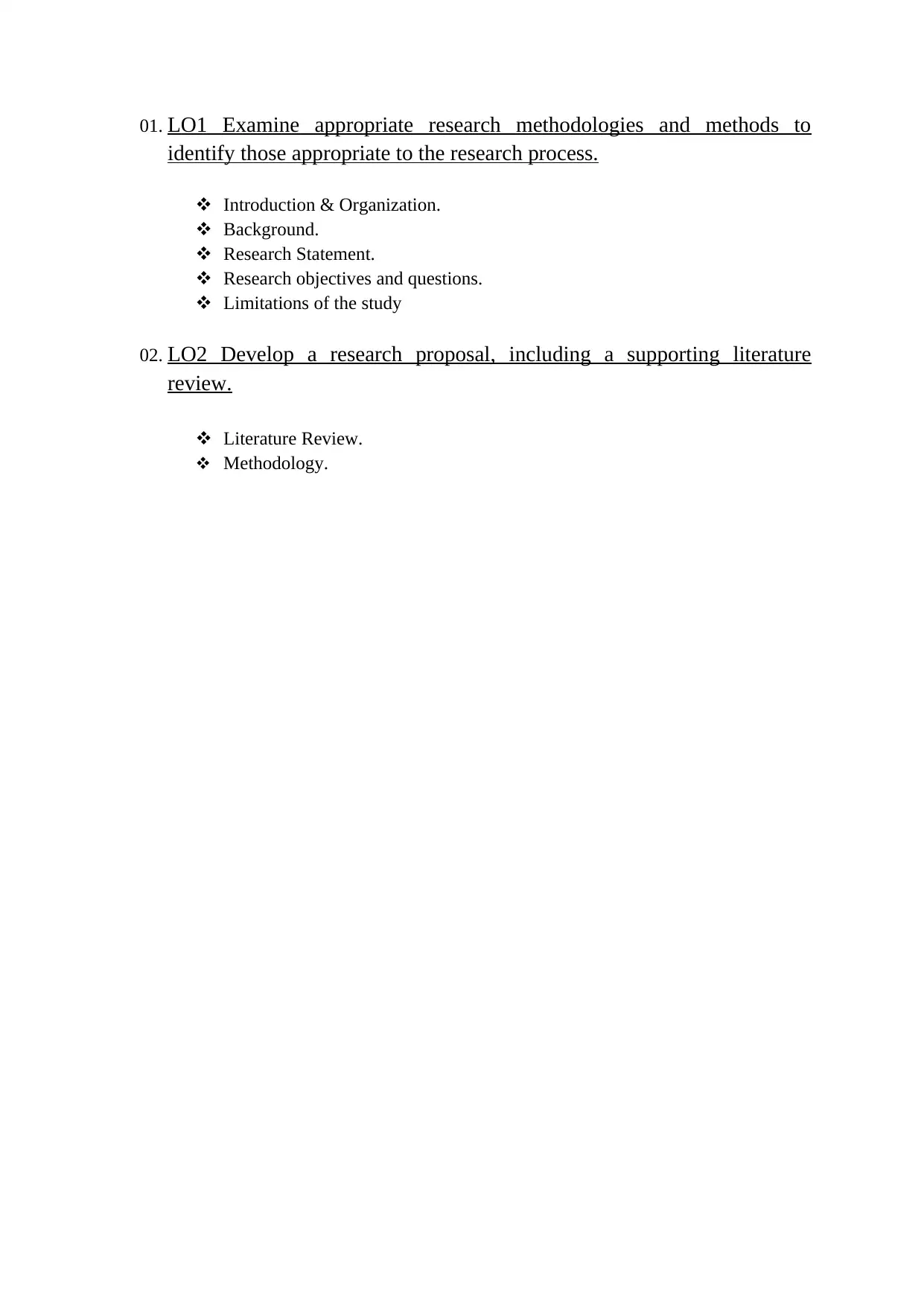
01. LO1 Examine appropriate research methodologies and methods to
identify those appropriate to the research process.
Introduction & Organization.
Background.
Research Statement.
Research objectives and questions.
Limitations of the study
02. LO2 Develop a research proposal, including a supporting literature
review.
Literature Review.
Methodology.
identify those appropriate to the research process.
Introduction & Organization.
Background.
Research Statement.
Research objectives and questions.
Limitations of the study
02. LO2 Develop a research proposal, including a supporting literature
review.
Literature Review.
Methodology.
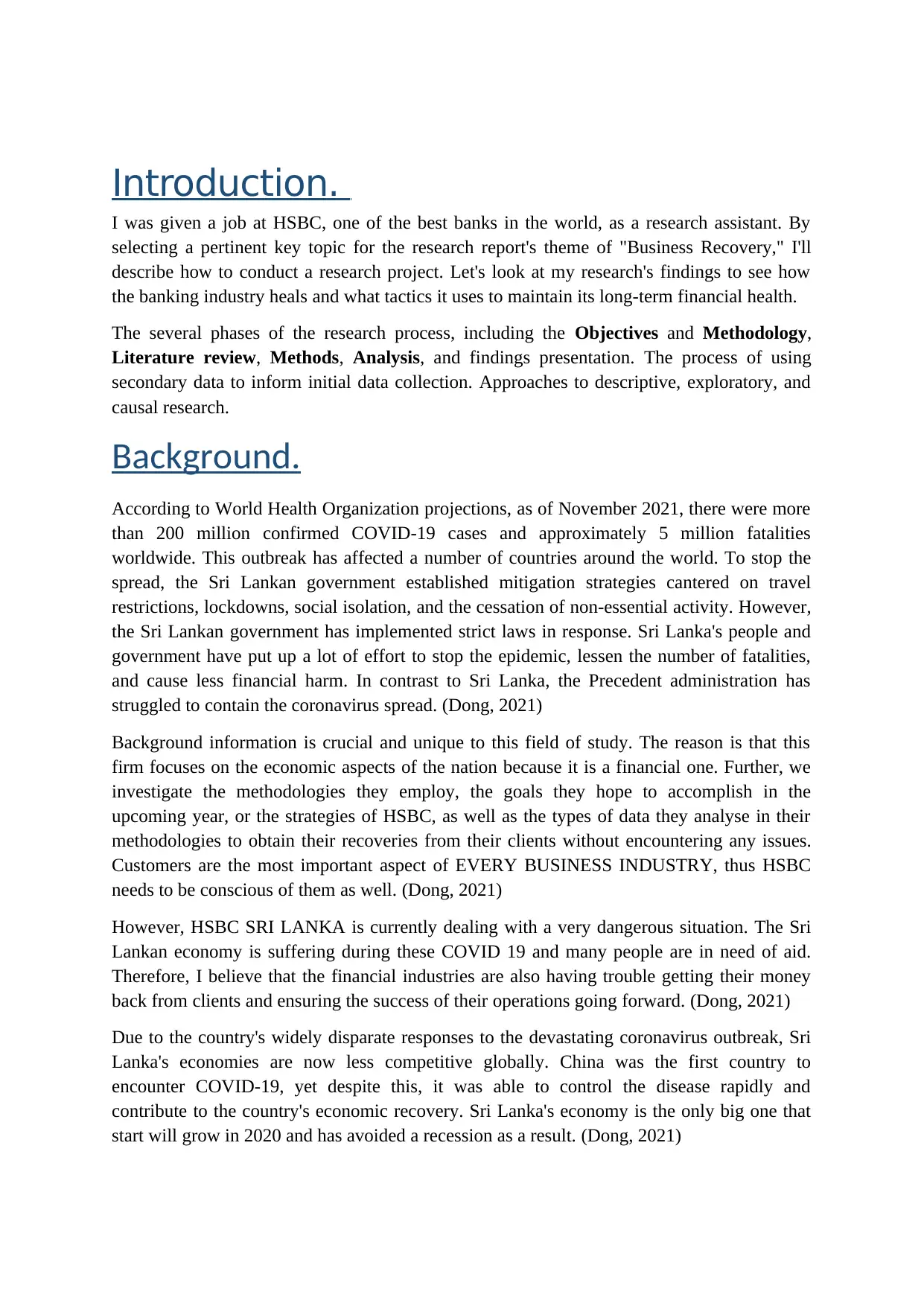
Introduction.
I was given a job at HSBC, one of the best banks in the world, as a research assistant. By
selecting a pertinent key topic for the research report's theme of "Business Recovery," I'll
describe how to conduct a research project. Let's look at my research's findings to see how
the banking industry heals and what tactics it uses to maintain its long-term financial health.
The several phases of the research process, including the Objectives and Methodology,
Literature review, Methods, Analysis, and findings presentation. The process of using
secondary data to inform initial data collection. Approaches to descriptive, exploratory, and
causal research.
Background.
According to World Health Organization projections, as of November 2021, there were more
than 200 million confirmed COVID-19 cases and approximately 5 million fatalities
worldwide. This outbreak has affected a number of countries around the world. To stop the
spread, the Sri Lankan government established mitigation strategies cantered on travel
restrictions, lockdowns, social isolation, and the cessation of non-essential activity. However,
the Sri Lankan government has implemented strict laws in response. Sri Lanka's people and
government have put up a lot of effort to stop the epidemic, lessen the number of fatalities,
and cause less financial harm. In contrast to Sri Lanka, the Precedent administration has
struggled to contain the coronavirus spread. (Dong, 2021)
Background information is crucial and unique to this field of study. The reason is that this
firm focuses on the economic aspects of the nation because it is a financial one. Further, we
investigate the methodologies they employ, the goals they hope to accomplish in the
upcoming year, or the strategies of HSBC, as well as the types of data they analyse in their
methodologies to obtain their recoveries from their clients without encountering any issues.
Customers are the most important aspect of EVERY BUSINESS INDUSTRY, thus HSBC
needs to be conscious of them as well. (Dong, 2021)
However, HSBC SRI LANKA is currently dealing with a very dangerous situation. The Sri
Lankan economy is suffering during these COVID 19 and many people are in need of aid.
Therefore, I believe that the financial industries are also having trouble getting their money
back from clients and ensuring the success of their operations going forward. (Dong, 2021)
Due to the country's widely disparate responses to the devastating coronavirus outbreak, Sri
Lanka's economies are now less competitive globally. China was the first country to
encounter COVID-19, yet despite this, it was able to control the disease rapidly and
contribute to the country's economic recovery. Sri Lanka's economy is the only big one that
start will grow in 2020 and has avoided a recession as a result. (Dong, 2021)
I was given a job at HSBC, one of the best banks in the world, as a research assistant. By
selecting a pertinent key topic for the research report's theme of "Business Recovery," I'll
describe how to conduct a research project. Let's look at my research's findings to see how
the banking industry heals and what tactics it uses to maintain its long-term financial health.
The several phases of the research process, including the Objectives and Methodology,
Literature review, Methods, Analysis, and findings presentation. The process of using
secondary data to inform initial data collection. Approaches to descriptive, exploratory, and
causal research.
Background.
According to World Health Organization projections, as of November 2021, there were more
than 200 million confirmed COVID-19 cases and approximately 5 million fatalities
worldwide. This outbreak has affected a number of countries around the world. To stop the
spread, the Sri Lankan government established mitigation strategies cantered on travel
restrictions, lockdowns, social isolation, and the cessation of non-essential activity. However,
the Sri Lankan government has implemented strict laws in response. Sri Lanka's people and
government have put up a lot of effort to stop the epidemic, lessen the number of fatalities,
and cause less financial harm. In contrast to Sri Lanka, the Precedent administration has
struggled to contain the coronavirus spread. (Dong, 2021)
Background information is crucial and unique to this field of study. The reason is that this
firm focuses on the economic aspects of the nation because it is a financial one. Further, we
investigate the methodologies they employ, the goals they hope to accomplish in the
upcoming year, or the strategies of HSBC, as well as the types of data they analyse in their
methodologies to obtain their recoveries from their clients without encountering any issues.
Customers are the most important aspect of EVERY BUSINESS INDUSTRY, thus HSBC
needs to be conscious of them as well. (Dong, 2021)
However, HSBC SRI LANKA is currently dealing with a very dangerous situation. The Sri
Lankan economy is suffering during these COVID 19 and many people are in need of aid.
Therefore, I believe that the financial industries are also having trouble getting their money
back from clients and ensuring the success of their operations going forward. (Dong, 2021)
Due to the country's widely disparate responses to the devastating coronavirus outbreak, Sri
Lanka's economies are now less competitive globally. China was the first country to
encounter COVID-19, yet despite this, it was able to control the disease rapidly and
contribute to the country's economic recovery. Sri Lanka's economy is the only big one that
start will grow in 2020 and has avoided a recession as a result. (Dong, 2021)
⊘ This is a preview!⊘
Do you want full access?
Subscribe today to unlock all pages.

Trusted by 1+ million students worldwide
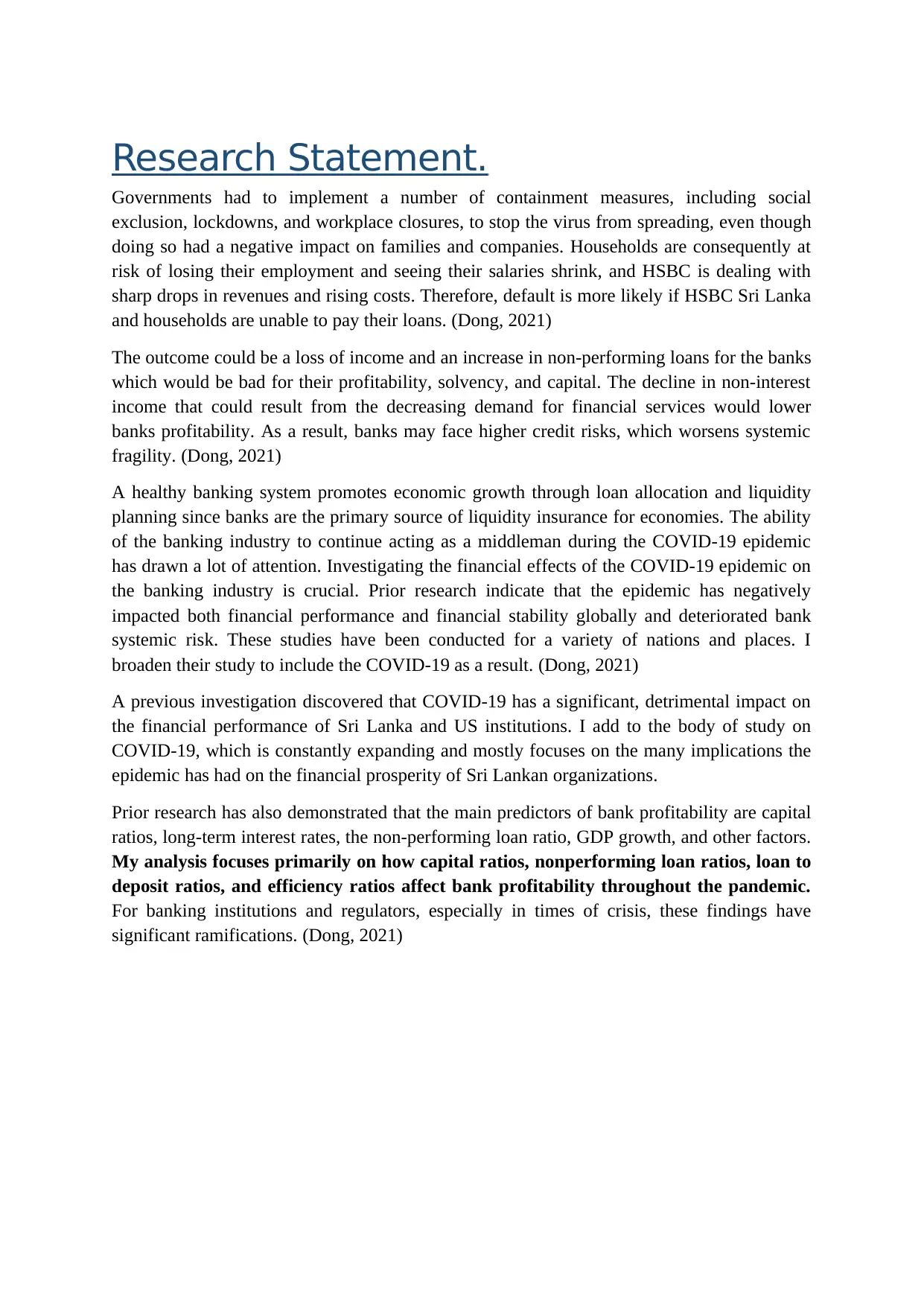
Research Statement.
Governments had to implement a number of containment measures, including social
exclusion, lockdowns, and workplace closures, to stop the virus from spreading, even though
doing so had a negative impact on families and companies. Households are consequently at
risk of losing their employment and seeing their salaries shrink, and HSBC is dealing with
sharp drops in revenues and rising costs. Therefore, default is more likely if HSBC Sri Lanka
and households are unable to pay their loans. (Dong, 2021)
The outcome could be a loss of income and an increase in non-performing loans for the banks
which would be bad for their profitability, solvency, and capital. The decline in non-interest
income that could result from the decreasing demand for financial services would lower
banks profitability. As a result, banks may face higher credit risks, which worsens systemic
fragility. (Dong, 2021)
A healthy banking system promotes economic growth through loan allocation and liquidity
planning since banks are the primary source of liquidity insurance for economies. The ability
of the banking industry to continue acting as a middleman during the COVID-19 epidemic
has drawn a lot of attention. Investigating the financial effects of the COVID-19 epidemic on
the banking industry is crucial. Prior research indicate that the epidemic has negatively
impacted both financial performance and financial stability globally and deteriorated bank
systemic risk. These studies have been conducted for a variety of nations and places. I
broaden their study to include the COVID-19 as a result. (Dong, 2021)
A previous investigation discovered that COVID-19 has a significant, detrimental impact on
the financial performance of Sri Lanka and US institutions. I add to the body of study on
COVID-19, which is constantly expanding and mostly focuses on the many implications the
epidemic has had on the financial prosperity of Sri Lankan organizations.
Prior research has also demonstrated that the main predictors of bank profitability are capital
ratios, long-term interest rates, the non-performing loan ratio, GDP growth, and other factors.
My analysis focuses primarily on how capital ratios, nonperforming loan ratios, loan to
deposit ratios, and efficiency ratios affect bank profitability throughout the pandemic.
For banking institutions and regulators, especially in times of crisis, these findings have
significant ramifications. (Dong, 2021)
Governments had to implement a number of containment measures, including social
exclusion, lockdowns, and workplace closures, to stop the virus from spreading, even though
doing so had a negative impact on families and companies. Households are consequently at
risk of losing their employment and seeing their salaries shrink, and HSBC is dealing with
sharp drops in revenues and rising costs. Therefore, default is more likely if HSBC Sri Lanka
and households are unable to pay their loans. (Dong, 2021)
The outcome could be a loss of income and an increase in non-performing loans for the banks
which would be bad for their profitability, solvency, and capital. The decline in non-interest
income that could result from the decreasing demand for financial services would lower
banks profitability. As a result, banks may face higher credit risks, which worsens systemic
fragility. (Dong, 2021)
A healthy banking system promotes economic growth through loan allocation and liquidity
planning since banks are the primary source of liquidity insurance for economies. The ability
of the banking industry to continue acting as a middleman during the COVID-19 epidemic
has drawn a lot of attention. Investigating the financial effects of the COVID-19 epidemic on
the banking industry is crucial. Prior research indicate that the epidemic has negatively
impacted both financial performance and financial stability globally and deteriorated bank
systemic risk. These studies have been conducted for a variety of nations and places. I
broaden their study to include the COVID-19 as a result. (Dong, 2021)
A previous investigation discovered that COVID-19 has a significant, detrimental impact on
the financial performance of Sri Lanka and US institutions. I add to the body of study on
COVID-19, which is constantly expanding and mostly focuses on the many implications the
epidemic has had on the financial prosperity of Sri Lankan organizations.
Prior research has also demonstrated that the main predictors of bank profitability are capital
ratios, long-term interest rates, the non-performing loan ratio, GDP growth, and other factors.
My analysis focuses primarily on how capital ratios, nonperforming loan ratios, loan to
deposit ratios, and efficiency ratios affect bank profitability throughout the pandemic.
For banking institutions and regulators, especially in times of crisis, these findings have
significant ramifications. (Dong, 2021)
Paraphrase This Document
Need a fresh take? Get an instant paraphrase of this document with our AI Paraphraser
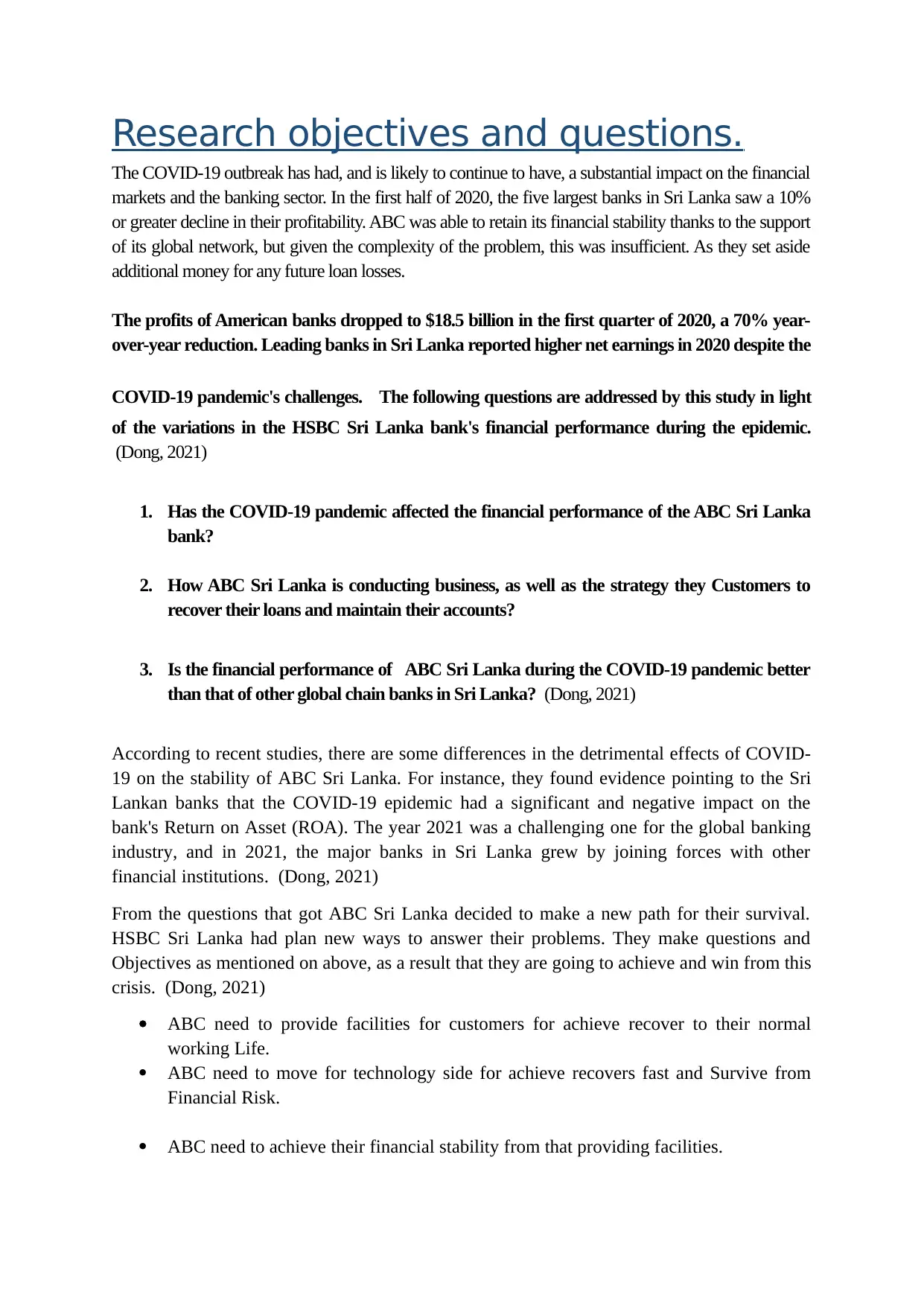
Research objectives and questions.
The COVID-19 outbreak has had, and is likely to continue to have, a substantial impact on the financial
markets and the banking sector. In the first half of 2020, the five largest banks in Sri Lanka saw a 10%
or greater decline in their profitability. ABC was able to retain its financial stability thanks to the support
of its global network, but given the complexity of the problem, this was insufficient. As they set aside
additional money for any future loan losses.
The profits of American banks dropped to $18.5 billion in the first quarter of 2020, a 70% year-
over-year reduction. Leading banks in Sri Lanka reported higher net earnings in 2020 despite the
COVID-19 pandemic's challenges. The following questions are addressed by this study in light
of the variations in the HSBC Sri Lanka bank's financial performance during the epidemic.
(Dong, 2021)
1. Has the COVID-19 pandemic affected the financial performance of the ABC Sri Lanka
bank?
2. How ABC Sri Lanka is conducting business, as well as the strategy they Customers to
recover their loans and maintain their accounts?
3. Is the financial performance of ABC Sri Lanka during the COVID-19 pandemic better
than that of other global chain banks in Sri Lanka? (Dong, 2021)
According to recent studies, there are some differences in the detrimental effects of COVID-
19 on the stability of ABC Sri Lanka. For instance, they found evidence pointing to the Sri
Lankan banks that the COVID-19 epidemic had a significant and negative impact on the
bank's Return on Asset (ROA). The year 2021 was a challenging one for the global banking
industry, and in 2021, the major banks in Sri Lanka grew by joining forces with other
financial institutions. (Dong, 2021)
From the questions that got ABC Sri Lanka decided to make a new path for their survival.
HSBC Sri Lanka had plan new ways to answer their problems. They make questions and
Objectives as mentioned on above, as a result that they are going to achieve and win from this
crisis. (Dong, 2021)
ABC need to provide facilities for customers for achieve recover to their normal
working Life.
ABC need to move for technology side for achieve recovers fast and Survive from
Financial Risk.
ABC need to achieve their financial stability from that providing facilities.
The COVID-19 outbreak has had, and is likely to continue to have, a substantial impact on the financial
markets and the banking sector. In the first half of 2020, the five largest banks in Sri Lanka saw a 10%
or greater decline in their profitability. ABC was able to retain its financial stability thanks to the support
of its global network, but given the complexity of the problem, this was insufficient. As they set aside
additional money for any future loan losses.
The profits of American banks dropped to $18.5 billion in the first quarter of 2020, a 70% year-
over-year reduction. Leading banks in Sri Lanka reported higher net earnings in 2020 despite the
COVID-19 pandemic's challenges. The following questions are addressed by this study in light
of the variations in the HSBC Sri Lanka bank's financial performance during the epidemic.
(Dong, 2021)
1. Has the COVID-19 pandemic affected the financial performance of the ABC Sri Lanka
bank?
2. How ABC Sri Lanka is conducting business, as well as the strategy they Customers to
recover their loans and maintain their accounts?
3. Is the financial performance of ABC Sri Lanka during the COVID-19 pandemic better
than that of other global chain banks in Sri Lanka? (Dong, 2021)
According to recent studies, there are some differences in the detrimental effects of COVID-
19 on the stability of ABC Sri Lanka. For instance, they found evidence pointing to the Sri
Lankan banks that the COVID-19 epidemic had a significant and negative impact on the
bank's Return on Asset (ROA). The year 2021 was a challenging one for the global banking
industry, and in 2021, the major banks in Sri Lanka grew by joining forces with other
financial institutions. (Dong, 2021)
From the questions that got ABC Sri Lanka decided to make a new path for their survival.
HSBC Sri Lanka had plan new ways to answer their problems. They make questions and
Objectives as mentioned on above, as a result that they are going to achieve and win from this
crisis. (Dong, 2021)
ABC need to provide facilities for customers for achieve recover to their normal
working Life.
ABC need to move for technology side for achieve recovers fast and Survive from
Financial Risk.
ABC need to achieve their financial stability from that providing facilities.
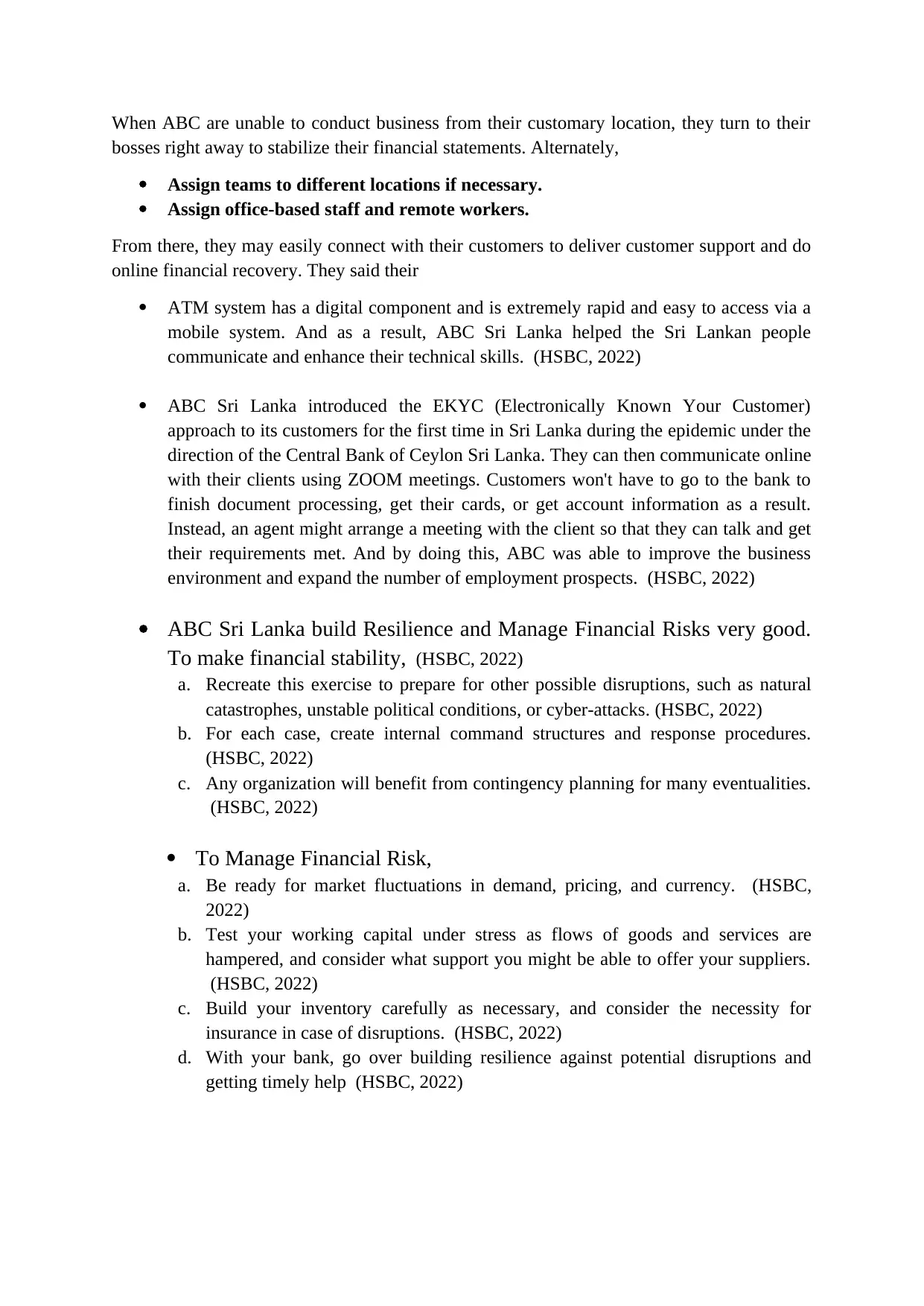
When ABC are unable to conduct business from their customary location, they turn to their
bosses right away to stabilize their financial statements. Alternately,
Assign teams to different locations if necessary.
Assign office-based staff and remote workers.
From there, they may easily connect with their customers to deliver customer support and do
online financial recovery. They said their
ATM system has a digital component and is extremely rapid and easy to access via a
mobile system. And as a result, ABC Sri Lanka helped the Sri Lankan people
communicate and enhance their technical skills. (HSBC, 2022)
ABC Sri Lanka introduced the EKYC (Electronically Known Your Customer)
approach to its customers for the first time in Sri Lanka during the epidemic under the
direction of the Central Bank of Ceylon Sri Lanka. They can then communicate online
with their clients using ZOOM meetings. Customers won't have to go to the bank to
finish document processing, get their cards, or get account information as a result.
Instead, an agent might arrange a meeting with the client so that they can talk and get
their requirements met. And by doing this, ABC was able to improve the business
environment and expand the number of employment prospects. (HSBC, 2022)
ABC Sri Lanka build Resilience and Manage Financial Risks very good.
To make financial stability, (HSBC, 2022)
a. Recreate this exercise to prepare for other possible disruptions, such as natural
catastrophes, unstable political conditions, or cyber-attacks. (HSBC, 2022)
b. For each case, create internal command structures and response procedures.
(HSBC, 2022)
c. Any organization will benefit from contingency planning for many eventualities.
(HSBC, 2022)
To Manage Financial Risk,
a. Be ready for market fluctuations in demand, pricing, and currency. (HSBC,
2022)
b. Test your working capital under stress as flows of goods and services are
hampered, and consider what support you might be able to offer your suppliers.
(HSBC, 2022)
c. Build your inventory carefully as necessary, and consider the necessity for
insurance in case of disruptions. (HSBC, 2022)
d. With your bank, go over building resilience against potential disruptions and
getting timely help (HSBC, 2022)
bosses right away to stabilize their financial statements. Alternately,
Assign teams to different locations if necessary.
Assign office-based staff and remote workers.
From there, they may easily connect with their customers to deliver customer support and do
online financial recovery. They said their
ATM system has a digital component and is extremely rapid and easy to access via a
mobile system. And as a result, ABC Sri Lanka helped the Sri Lankan people
communicate and enhance their technical skills. (HSBC, 2022)
ABC Sri Lanka introduced the EKYC (Electronically Known Your Customer)
approach to its customers for the first time in Sri Lanka during the epidemic under the
direction of the Central Bank of Ceylon Sri Lanka. They can then communicate online
with their clients using ZOOM meetings. Customers won't have to go to the bank to
finish document processing, get their cards, or get account information as a result.
Instead, an agent might arrange a meeting with the client so that they can talk and get
their requirements met. And by doing this, ABC was able to improve the business
environment and expand the number of employment prospects. (HSBC, 2022)
ABC Sri Lanka build Resilience and Manage Financial Risks very good.
To make financial stability, (HSBC, 2022)
a. Recreate this exercise to prepare for other possible disruptions, such as natural
catastrophes, unstable political conditions, or cyber-attacks. (HSBC, 2022)
b. For each case, create internal command structures and response procedures.
(HSBC, 2022)
c. Any organization will benefit from contingency planning for many eventualities.
(HSBC, 2022)
To Manage Financial Risk,
a. Be ready for market fluctuations in demand, pricing, and currency. (HSBC,
2022)
b. Test your working capital under stress as flows of goods and services are
hampered, and consider what support you might be able to offer your suppliers.
(HSBC, 2022)
c. Build your inventory carefully as necessary, and consider the necessity for
insurance in case of disruptions. (HSBC, 2022)
d. With your bank, go over building resilience against potential disruptions and
getting timely help (HSBC, 2022)
⊘ This is a preview!⊘
Do you want full access?
Subscribe today to unlock all pages.

Trusted by 1+ million students worldwide
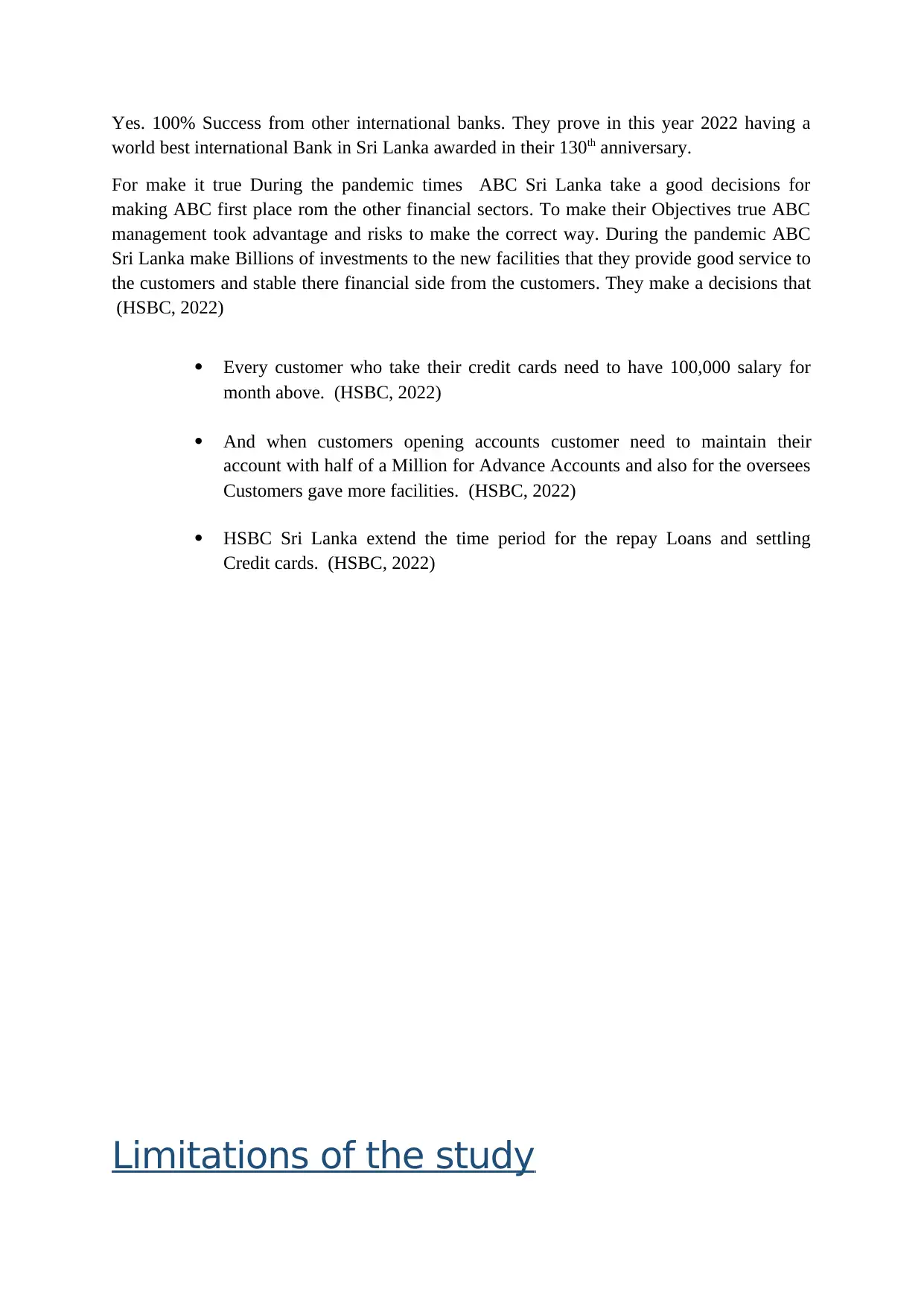
Yes. 100% Success from other international banks. They prove in this year 2022 having a
world best international Bank in Sri Lanka awarded in their 130th anniversary.
For make it true During the pandemic times ABC Sri Lanka take a good decisions for
making ABC first place rom the other financial sectors. To make their Objectives true ABC
management took advantage and risks to make the correct way. During the pandemic ABC
Sri Lanka make Billions of investments to the new facilities that they provide good service to
the customers and stable there financial side from the customers. They make a decisions that
(HSBC, 2022)
Every customer who take their credit cards need to have 100,000 salary for
month above. (HSBC, 2022)
And when customers opening accounts customer need to maintain their
account with half of a Million for Advance Accounts and also for the oversees
Customers gave more facilities. (HSBC, 2022)
HSBC Sri Lanka extend the time period for the repay Loans and settling
Credit cards. (HSBC, 2022)
Limitations of the study
world best international Bank in Sri Lanka awarded in their 130th anniversary.
For make it true During the pandemic times ABC Sri Lanka take a good decisions for
making ABC first place rom the other financial sectors. To make their Objectives true ABC
management took advantage and risks to make the correct way. During the pandemic ABC
Sri Lanka make Billions of investments to the new facilities that they provide good service to
the customers and stable there financial side from the customers. They make a decisions that
(HSBC, 2022)
Every customer who take their credit cards need to have 100,000 salary for
month above. (HSBC, 2022)
And when customers opening accounts customer need to maintain their
account with half of a Million for Advance Accounts and also for the oversees
Customers gave more facilities. (HSBC, 2022)
HSBC Sri Lanka extend the time period for the repay Loans and settling
Credit cards. (HSBC, 2022)
Limitations of the study
Paraphrase This Document
Need a fresh take? Get an instant paraphrase of this document with our AI Paraphraser
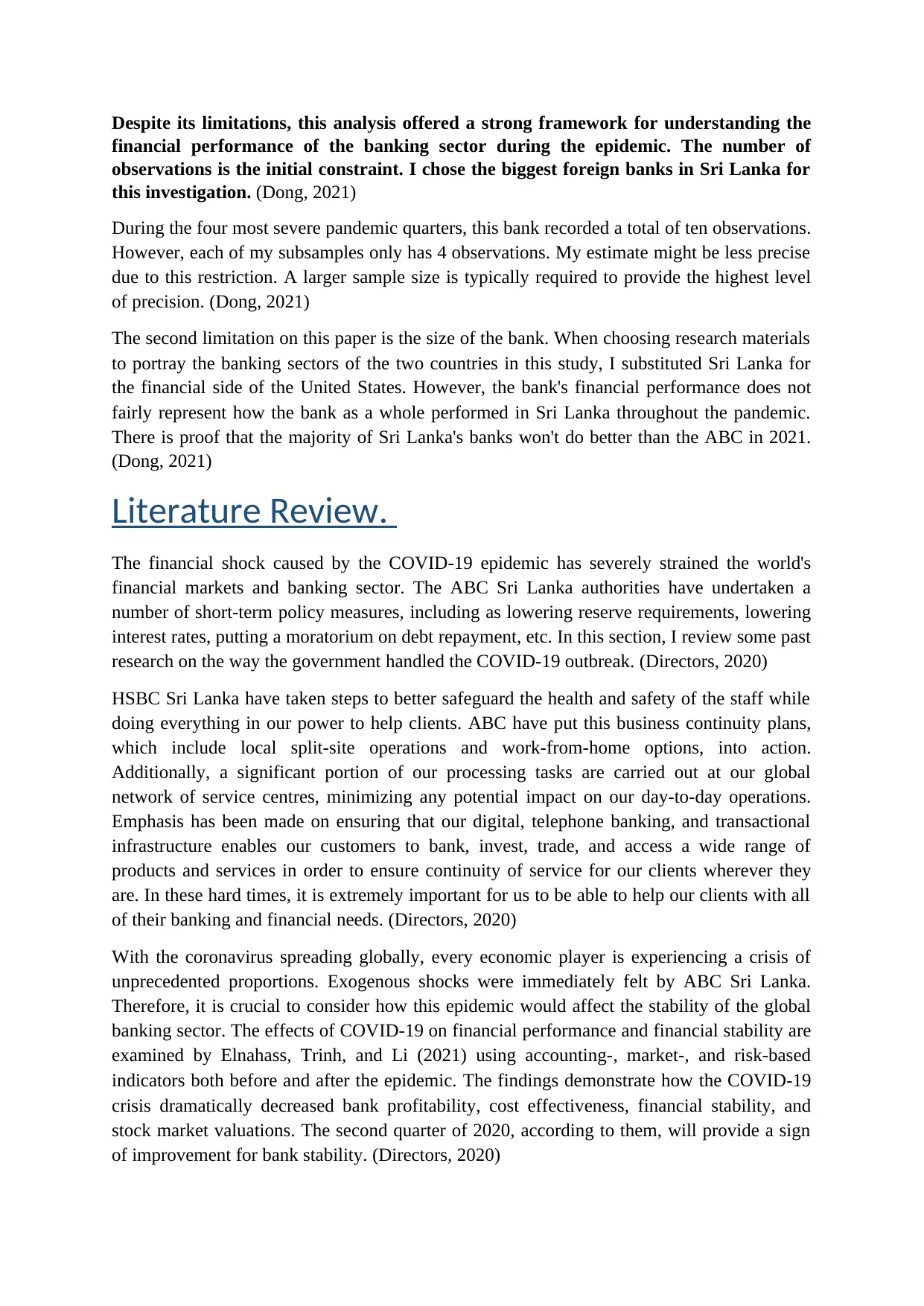
Despite its limitations, this analysis offered a strong framework for understanding the
financial performance of the banking sector during the epidemic. The number of
observations is the initial constraint. I chose the biggest foreign banks in Sri Lanka for
this investigation. (Dong, 2021)
During the four most severe pandemic quarters, this bank recorded a total of ten observations.
However, each of my subsamples only has 4 observations. My estimate might be less precise
due to this restriction. A larger sample size is typically required to provide the highest level
of precision. (Dong, 2021)
The second limitation on this paper is the size of the bank. When choosing research materials
to portray the banking sectors of the two countries in this study, I substituted Sri Lanka for
the financial side of the United States. However, the bank's financial performance does not
fairly represent how the bank as a whole performed in Sri Lanka throughout the pandemic.
There is proof that the majority of Sri Lanka's banks won't do better than the ABC in 2021.
(Dong, 2021)
Literature Review.
The financial shock caused by the COVID-19 epidemic has severely strained the world's
financial markets and banking sector. The ABC Sri Lanka authorities have undertaken a
number of short-term policy measures, including as lowering reserve requirements, lowering
interest rates, putting a moratorium on debt repayment, etc. In this section, I review some past
research on the way the government handled the COVID-19 outbreak. (Directors, 2020)
HSBC Sri Lanka have taken steps to better safeguard the health and safety of the staff while
doing everything in our power to help clients. ABC have put this business continuity plans,
which include local split-site operations and work-from-home options, into action.
Additionally, a significant portion of our processing tasks are carried out at our global
network of service centres, minimizing any potential impact on our day-to-day operations.
Emphasis has been made on ensuring that our digital, telephone banking, and transactional
infrastructure enables our customers to bank, invest, trade, and access a wide range of
products and services in order to ensure continuity of service for our clients wherever they
are. In these hard times, it is extremely important for us to be able to help our clients with all
of their banking and financial needs. (Directors, 2020)
With the coronavirus spreading globally, every economic player is experiencing a crisis of
unprecedented proportions. Exogenous shocks were immediately felt by ABC Sri Lanka.
Therefore, it is crucial to consider how this epidemic would affect the stability of the global
banking sector. The effects of COVID-19 on financial performance and financial stability are
examined by Elnahass, Trinh, and Li (2021) using accounting-, market-, and risk-based
indicators both before and after the epidemic. The findings demonstrate how the COVID-19
crisis dramatically decreased bank profitability, cost effectiveness, financial stability, and
stock market valuations. The second quarter of 2020, according to them, will provide a sign
of improvement for bank stability. (Directors, 2020)
financial performance of the banking sector during the epidemic. The number of
observations is the initial constraint. I chose the biggest foreign banks in Sri Lanka for
this investigation. (Dong, 2021)
During the four most severe pandemic quarters, this bank recorded a total of ten observations.
However, each of my subsamples only has 4 observations. My estimate might be less precise
due to this restriction. A larger sample size is typically required to provide the highest level
of precision. (Dong, 2021)
The second limitation on this paper is the size of the bank. When choosing research materials
to portray the banking sectors of the two countries in this study, I substituted Sri Lanka for
the financial side of the United States. However, the bank's financial performance does not
fairly represent how the bank as a whole performed in Sri Lanka throughout the pandemic.
There is proof that the majority of Sri Lanka's banks won't do better than the ABC in 2021.
(Dong, 2021)
Literature Review.
The financial shock caused by the COVID-19 epidemic has severely strained the world's
financial markets and banking sector. The ABC Sri Lanka authorities have undertaken a
number of short-term policy measures, including as lowering reserve requirements, lowering
interest rates, putting a moratorium on debt repayment, etc. In this section, I review some past
research on the way the government handled the COVID-19 outbreak. (Directors, 2020)
HSBC Sri Lanka have taken steps to better safeguard the health and safety of the staff while
doing everything in our power to help clients. ABC have put this business continuity plans,
which include local split-site operations and work-from-home options, into action.
Additionally, a significant portion of our processing tasks are carried out at our global
network of service centres, minimizing any potential impact on our day-to-day operations.
Emphasis has been made on ensuring that our digital, telephone banking, and transactional
infrastructure enables our customers to bank, invest, trade, and access a wide range of
products and services in order to ensure continuity of service for our clients wherever they
are. In these hard times, it is extremely important for us to be able to help our clients with all
of their banking and financial needs. (Directors, 2020)
With the coronavirus spreading globally, every economic player is experiencing a crisis of
unprecedented proportions. Exogenous shocks were immediately felt by ABC Sri Lanka.
Therefore, it is crucial to consider how this epidemic would affect the stability of the global
banking sector. The effects of COVID-19 on financial performance and financial stability are
examined by Elnahass, Trinh, and Li (2021) using accounting-, market-, and risk-based
indicators both before and after the epidemic. The findings demonstrate how the COVID-19
crisis dramatically decreased bank profitability, cost effectiveness, financial stability, and
stock market valuations. The second quarter of 2020, according to them, will provide a sign
of improvement for bank stability. (Directors, 2020)
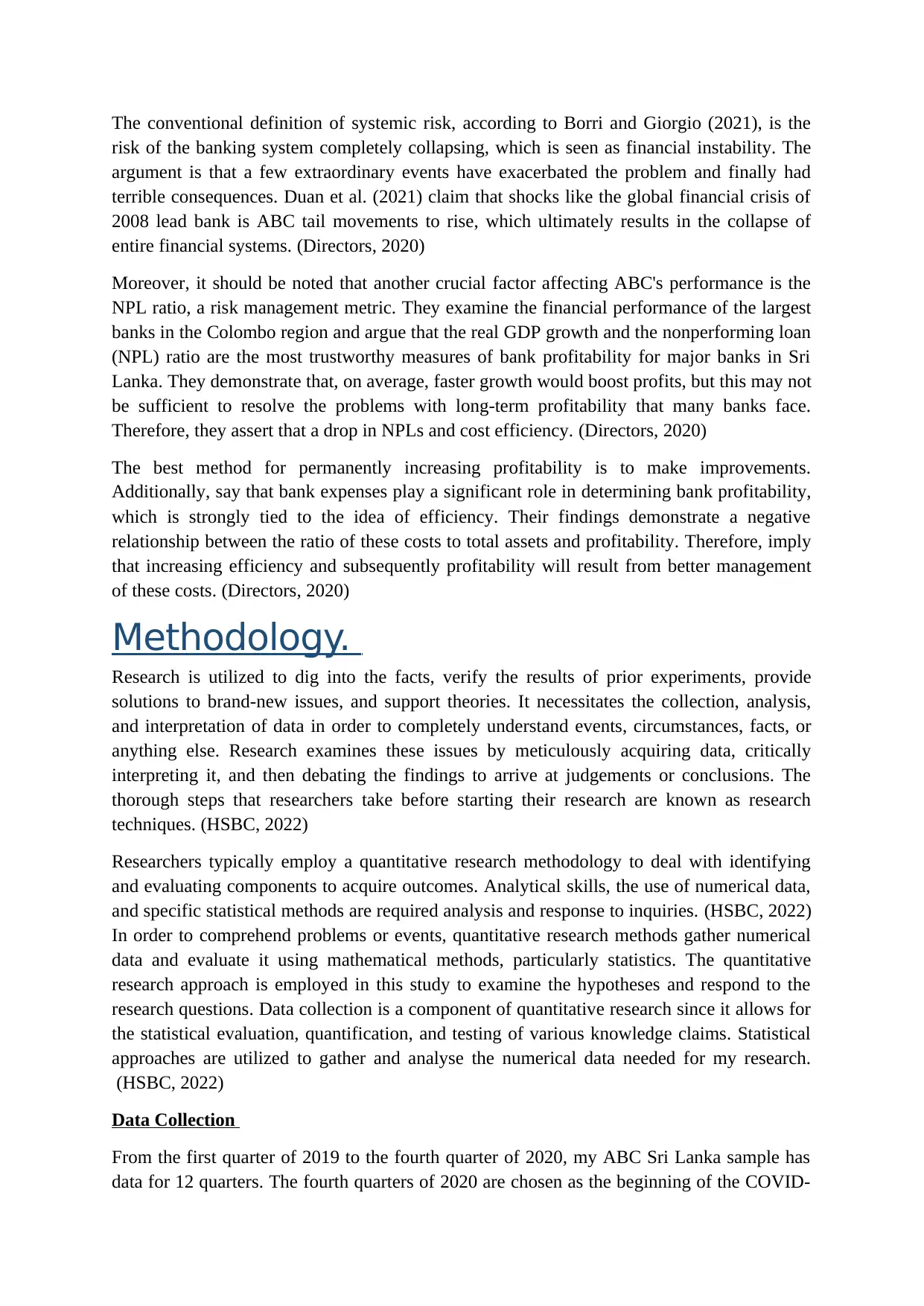
The conventional definition of systemic risk, according to Borri and Giorgio (2021), is the
risk of the banking system completely collapsing, which is seen as financial instability. The
argument is that a few extraordinary events have exacerbated the problem and finally had
terrible consequences. Duan et al. (2021) claim that shocks like the global financial crisis of
2008 lead bank is ABC tail movements to rise, which ultimately results in the collapse of
entire financial systems. (Directors, 2020)
Moreover, it should be noted that another crucial factor affecting ABC's performance is the
NPL ratio, a risk management metric. They examine the financial performance of the largest
banks in the Colombo region and argue that the real GDP growth and the nonperforming loan
(NPL) ratio are the most trustworthy measures of bank profitability for major banks in Sri
Lanka. They demonstrate that, on average, faster growth would boost profits, but this may not
be sufficient to resolve the problems with long-term profitability that many banks face.
Therefore, they assert that a drop in NPLs and cost efficiency. (Directors, 2020)
The best method for permanently increasing profitability is to make improvements.
Additionally, say that bank expenses play a significant role in determining bank profitability,
which is strongly tied to the idea of efficiency. Their findings demonstrate a negative
relationship between the ratio of these costs to total assets and profitability. Therefore, imply
that increasing efficiency and subsequently profitability will result from better management
of these costs. (Directors, 2020)
Methodology.
Research is utilized to dig into the facts, verify the results of prior experiments, provide
solutions to brand-new issues, and support theories. It necessitates the collection, analysis,
and interpretation of data in order to completely understand events, circumstances, facts, or
anything else. Research examines these issues by meticulously acquiring data, critically
interpreting it, and then debating the findings to arrive at judgements or conclusions. The
thorough steps that researchers take before starting their research are known as research
techniques. (HSBC, 2022)
Researchers typically employ a quantitative research methodology to deal with identifying
and evaluating components to acquire outcomes. Analytical skills, the use of numerical data,
and specific statistical methods are required analysis and response to inquiries. (HSBC, 2022)
In order to comprehend problems or events, quantitative research methods gather numerical
data and evaluate it using mathematical methods, particularly statistics. The quantitative
research approach is employed in this study to examine the hypotheses and respond to the
research questions. Data collection is a component of quantitative research since it allows for
the statistical evaluation, quantification, and testing of various knowledge claims. Statistical
approaches are utilized to gather and analyse the numerical data needed for my research.
(HSBC, 2022)
Data Collection
From the first quarter of 2019 to the fourth quarter of 2020, my ABC Sri Lanka sample has
data for 12 quarters. The fourth quarters of 2020 are chosen as the beginning of the COVID-
risk of the banking system completely collapsing, which is seen as financial instability. The
argument is that a few extraordinary events have exacerbated the problem and finally had
terrible consequences. Duan et al. (2021) claim that shocks like the global financial crisis of
2008 lead bank is ABC tail movements to rise, which ultimately results in the collapse of
entire financial systems. (Directors, 2020)
Moreover, it should be noted that another crucial factor affecting ABC's performance is the
NPL ratio, a risk management metric. They examine the financial performance of the largest
banks in the Colombo region and argue that the real GDP growth and the nonperforming loan
(NPL) ratio are the most trustworthy measures of bank profitability for major banks in Sri
Lanka. They demonstrate that, on average, faster growth would boost profits, but this may not
be sufficient to resolve the problems with long-term profitability that many banks face.
Therefore, they assert that a drop in NPLs and cost efficiency. (Directors, 2020)
The best method for permanently increasing profitability is to make improvements.
Additionally, say that bank expenses play a significant role in determining bank profitability,
which is strongly tied to the idea of efficiency. Their findings demonstrate a negative
relationship between the ratio of these costs to total assets and profitability. Therefore, imply
that increasing efficiency and subsequently profitability will result from better management
of these costs. (Directors, 2020)
Methodology.
Research is utilized to dig into the facts, verify the results of prior experiments, provide
solutions to brand-new issues, and support theories. It necessitates the collection, analysis,
and interpretation of data in order to completely understand events, circumstances, facts, or
anything else. Research examines these issues by meticulously acquiring data, critically
interpreting it, and then debating the findings to arrive at judgements or conclusions. The
thorough steps that researchers take before starting their research are known as research
techniques. (HSBC, 2022)
Researchers typically employ a quantitative research methodology to deal with identifying
and evaluating components to acquire outcomes. Analytical skills, the use of numerical data,
and specific statistical methods are required analysis and response to inquiries. (HSBC, 2022)
In order to comprehend problems or events, quantitative research methods gather numerical
data and evaluate it using mathematical methods, particularly statistics. The quantitative
research approach is employed in this study to examine the hypotheses and respond to the
research questions. Data collection is a component of quantitative research since it allows for
the statistical evaluation, quantification, and testing of various knowledge claims. Statistical
approaches are utilized to gather and analyse the numerical data needed for my research.
(HSBC, 2022)
Data Collection
From the first quarter of 2019 to the fourth quarter of 2020, my ABC Sri Lanka sample has
data for 12 quarters. The fourth quarters of 2020 are chosen as the beginning of the COVID-
⊘ This is a preview!⊘
Do you want full access?
Subscribe today to unlock all pages.

Trusted by 1+ million students worldwide
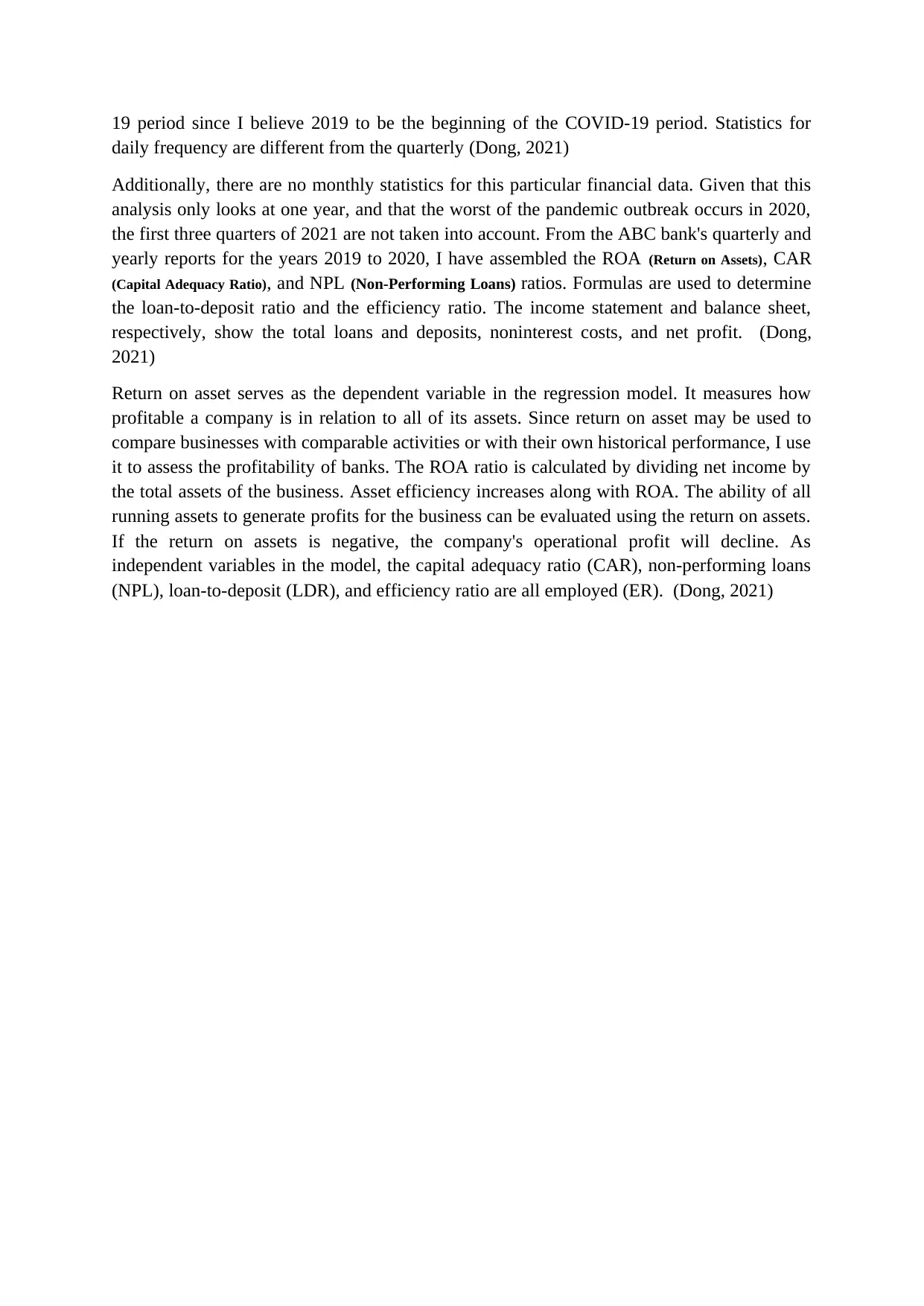
19 period since I believe 2019 to be the beginning of the COVID-19 period. Statistics for
daily frequency are different from the quarterly (Dong, 2021)
Additionally, there are no monthly statistics for this particular financial data. Given that this
analysis only looks at one year, and that the worst of the pandemic outbreak occurs in 2020,
the first three quarters of 2021 are not taken into account. From the ABC bank's quarterly and
yearly reports for the years 2019 to 2020, I have assembled the ROA (Return on Assets), CAR
(Capital Adequacy Ratio), and NPL (Non-Performing Loans) ratios. Formulas are used to determine
the loan-to-deposit ratio and the efficiency ratio. The income statement and balance sheet,
respectively, show the total loans and deposits, noninterest costs, and net profit. (Dong,
2021)
Return on asset serves as the dependent variable in the regression model. It measures how
profitable a company is in relation to all of its assets. Since return on asset may be used to
compare businesses with comparable activities or with their own historical performance, I use
it to assess the profitability of banks. The ROA ratio is calculated by dividing net income by
the total assets of the business. Asset efficiency increases along with ROA. The ability of all
running assets to generate profits for the business can be evaluated using the return on assets.
If the return on assets is negative, the company's operational profit will decline. As
independent variables in the model, the capital adequacy ratio (CAR), non-performing loans
(NPL), loan-to-deposit (LDR), and efficiency ratio are all employed (ER). (Dong, 2021)
daily frequency are different from the quarterly (Dong, 2021)
Additionally, there are no monthly statistics for this particular financial data. Given that this
analysis only looks at one year, and that the worst of the pandemic outbreak occurs in 2020,
the first three quarters of 2021 are not taken into account. From the ABC bank's quarterly and
yearly reports for the years 2019 to 2020, I have assembled the ROA (Return on Assets), CAR
(Capital Adequacy Ratio), and NPL (Non-Performing Loans) ratios. Formulas are used to determine
the loan-to-deposit ratio and the efficiency ratio. The income statement and balance sheet,
respectively, show the total loans and deposits, noninterest costs, and net profit. (Dong,
2021)
Return on asset serves as the dependent variable in the regression model. It measures how
profitable a company is in relation to all of its assets. Since return on asset may be used to
compare businesses with comparable activities or with their own historical performance, I use
it to assess the profitability of banks. The ROA ratio is calculated by dividing net income by
the total assets of the business. Asset efficiency increases along with ROA. The ability of all
running assets to generate profits for the business can be evaluated using the return on assets.
If the return on assets is negative, the company's operational profit will decline. As
independent variables in the model, the capital adequacy ratio (CAR), non-performing loans
(NPL), loan-to-deposit (LDR), and efficiency ratio are all employed (ER). (Dong, 2021)
Paraphrase This Document
Need a fresh take? Get an instant paraphrase of this document with our AI Paraphraser
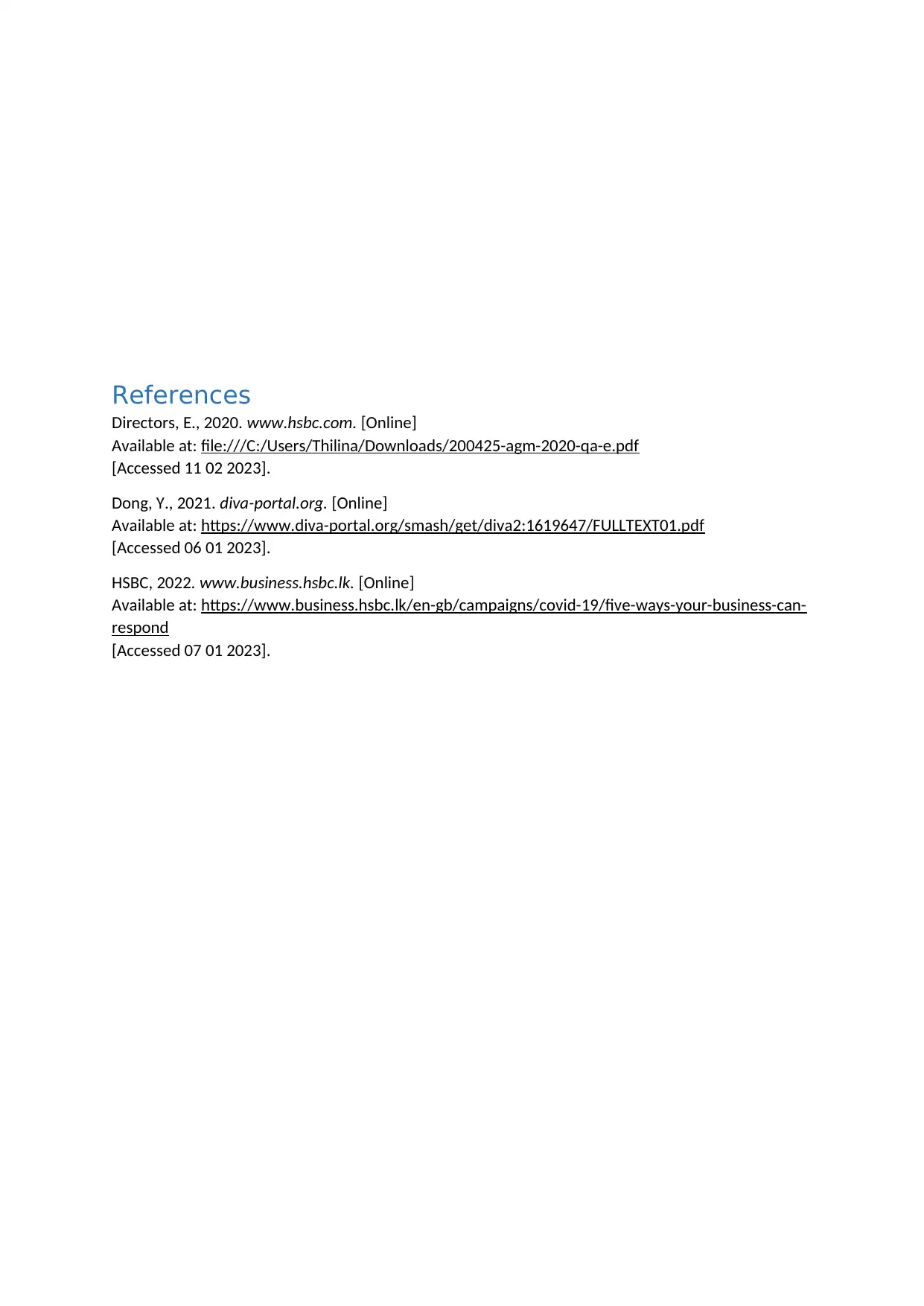
References
Directors, E., 2020. www.hsbc.com. [Online]
Available at: file:///C:/Users/Thilina/Downloads/200425-agm-2020-qa-e.pdf
[Accessed 11 02 2023].
Dong, Y., 2021. diva-portal.org. [Online]
Available at: https://www.diva-portal.org/smash/get/diva2:1619647/FULLTEXT01.pdf
[Accessed 06 01 2023].
HSBC, 2022. www.business.hsbc.lk. [Online]
Available at: https://www.business.hsbc.lk/en-gb/campaigns/covid-19/five-ways-your-business-can-
respond
[Accessed 07 01 2023].
Directors, E., 2020. www.hsbc.com. [Online]
Available at: file:///C:/Users/Thilina/Downloads/200425-agm-2020-qa-e.pdf
[Accessed 11 02 2023].
Dong, Y., 2021. diva-portal.org. [Online]
Available at: https://www.diva-portal.org/smash/get/diva2:1619647/FULLTEXT01.pdf
[Accessed 06 01 2023].
HSBC, 2022. www.business.hsbc.lk. [Online]
Available at: https://www.business.hsbc.lk/en-gb/campaigns/covid-19/five-ways-your-business-can-
respond
[Accessed 07 01 2023].

⊘ This is a preview!⊘
Do you want full access?
Subscribe today to unlock all pages.

Trusted by 1+ million students worldwide
1 out of 13
Related Documents
Your All-in-One AI-Powered Toolkit for Academic Success.
+13062052269
info@desklib.com
Available 24*7 on WhatsApp / Email
![[object Object]](/_next/static/media/star-bottom.7253800d.svg)
Unlock your academic potential
Copyright © 2020–2025 A2Z Services. All Rights Reserved. Developed and managed by ZUCOL.


